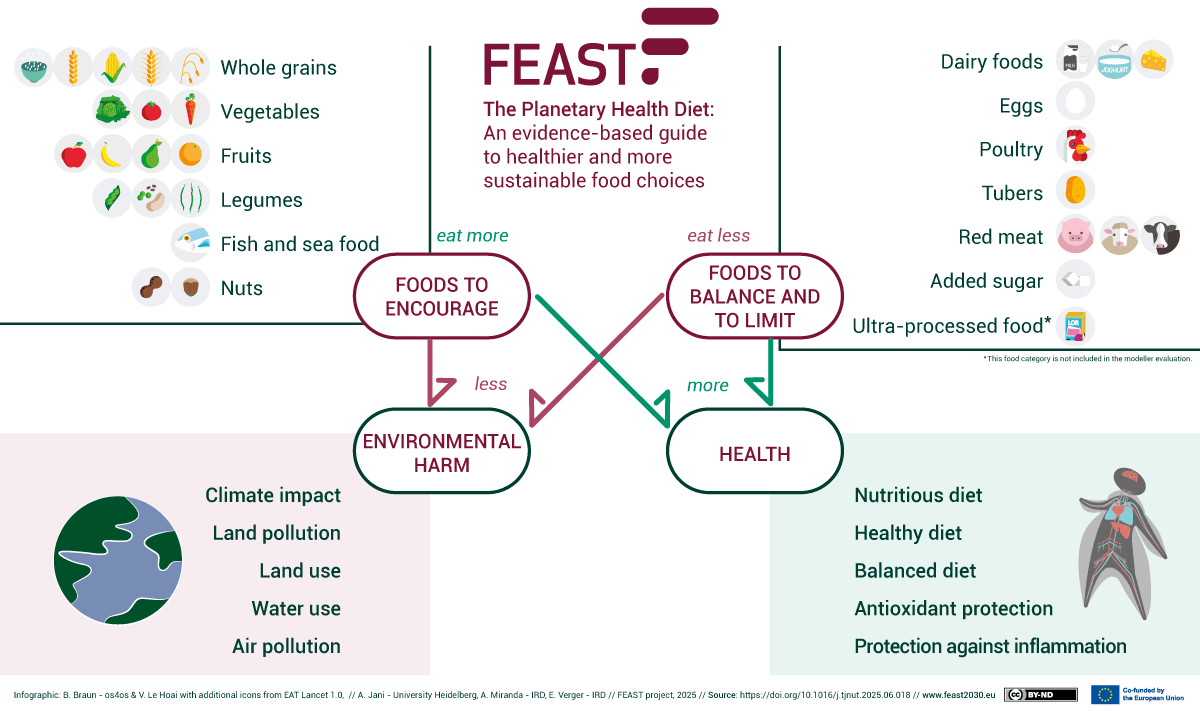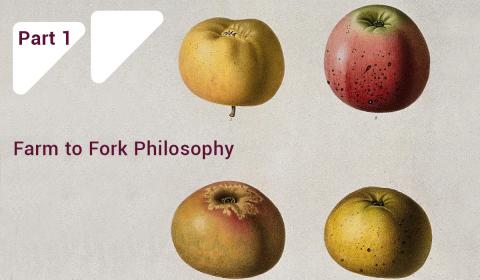
Image source: FEAST, 2025
In the face of climate change and rising diet-related health issues, finding practical ways to promote sustainable and healthy eating is more urgent than ever. A recent study published in The Journal of Nutrition introduces a promising new solution: the EAT-Lancet Consumption Frequency Index (ELFI). Designed for large-scale dietary surveys, this tool simplifies the assessment of how closely people’s diets align with the EAT-Lancet Planetary Health Diet — a dietary model that supports both human and planetary well-being.
Read the full scientific publication.
What is the EAT-Lancet Diet?
The EAT-Lancet Commission’s planetary health diet, launched in 2019, recommends increased consumption of plant-based foods — vegetables, fruits, legumes, whole grains, and nuts — while limiting animal source foods and added sugars. The goal is to improve human health while ensuring environmental sustainability.
However, assessing adherence to such a diet at the population level has been challenging. Traditional dietary surveys are costly, time-consuming, and burdensome for participants. That’s where ELFI steps in.
What is ELFI?
ELFI (EAT-Lancet Consumption Frequency Index) is a new dietary scoring system developed using a simple food propensity questionnaire (FPQ) based on how often people consume certain food groups — no need for complex food diaries or precise quantities.
Using data from the FEAST survey (covering over 27,000 adults across 27 European countries), researchers crafted a scoring system across 14 food groups. These groups were classified into:
- Foods to Encourage (e.g., fruits, vegetables, legumes, nuts, fish)
- Foods to Balance (e.g., dairy, eggs, poultry, red meat)
- Foods to Limit (e.g., animal fats and added sugars)
Participants receive scores based on how often they consume these foods, with higher scores indicating greater alignment with the planetary health diet.

Validating ELFI: Does It Work?
To validate ELFI’s accuracy, the index was compared with existing gold-standard dietary recall data from the INCA3 national survey in France. Key findings include:
- Strong reliability (Cronbach’s α > 0.80) and clear structure: the index consistently grouped healthy and less healthy foods into meaningful categories.
- Positive correlation with health indicators: Higher ELFI scores were associated with improved nutrient adequacy, better diet quality, and lower inflammatory potential.
- Environmental benefits: Diets scoring high on ELFI were linked to lower greenhouse gas emissions, land use, and water, air, and land pollution — though they did slightly increase water use.
Why ELFI Matters
For researchers, ELFI offers a valid and cost-effective alternative to traditional dietary assessment methods, allowing large-scale studies without sacrificing accuracy. It is especially relevant in multicountry contexts, where standardized but adaptable tools are essential.
For the general public and policymakers, ELFI provides insights into population-level dietary trends and their impacts on both health and the environment. It helps identify where dietary shifts are needed and supports food system transformation through data-informed decisions.
Real-World Implications
The FEAST survey found that most Europeans still fall short of adhering to the planetary health diet. However, the INCA3 data also revealed that people who consume more plant-based foods and fewer animal products enjoy both health and environmental benefits — supporting the idea that diet change is a powerful lever for sustainability.
Still, the authors caution against a one-size-fits-all approach. While ELFI favors plant-rich diets, the model was designed to ensure flexibility, especially for nutrient-dense animal products like dairy and eggs, which can be important in various cultural and economic contexts.
The Road Ahead
As the global community looks toward more sustainable food systems, tools like ELFI are critical. The researchers recommend adapting the ELFI to non-European populations and exploring its use in low- and middle-income countries. They also advocate refining the model to better account for nutrient adequacy across diverse diets.
In short, ELFI is not just a scientific advancement — it’s a step toward a healthier planet and population.
Reference: Miranda, A., Murante, A.M., Manca, F., Consalez, F., Jani, A., DeClerck, F., Maillot, M., & Verger, E. (2025). Assessing Sustainable and Healthy Diets in Large-Scale Surveys: Validity and Applicability of a Dietary Index Based on a Brief Food Group Propensity Questionnaire Representing the EAT-Lancet Planetary Health Diet. The Journal of Nutrition, 155, 3084–3096.


